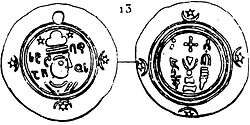Persophilia
Persophilia refers to the appreciation and love of the culture, people or history of Iran (Persia). The earliest use of the word may have been by the Royal Numismatic Society in 1838;[1] it referred to a king of Marium, in modern-day Cyprus. The opposite of Persophilia is Persophobia or anti-Iranianism.
Origins
Admiration of the Persians was especially high during the Achaemenid dynasty. Its founder, Cyrus the Great, was the only Gentile to be considered a messiah in the Bible.[2] Alexander the Great, who conquered the empire in its entirely, was himself an avid admirer of Cyrus the Great, and adopted Persian customs. The Macedonian satrap Peucestas gained the support of his subjects in Persis due to his Persophilia.[3] Ancient Greek leaders of the Achaemenid period who gave themselves Persian titles or names were considered Persophiles.[4] The kings of Sidonian whose governmental policies gave special rights to the Persians may also be referred to as Persophiles.[5]

Caucasian leaders who sided with the Sasanians are branded as Persophiles, such as Stephen I of Iberia.[6]
Early Abbasid caliphs Harun al-Rashid and Al-Ma'mun are described as Persophile by the English author Percy Sykes,[7] due to their pro-Persian policies.
Admiration of Persian culture continued in Mughal Empire in South Asia; for example, Abdul Rahim Khan-e-Khana being the foremost Persophile of his time.[8]
One of the most prominent contemporary Persophiles was the British literary historian Edward Granville Browne, who participated in the 1906 Persian Constitutional Revolution.
A recent book on Persophilia is the Iranian Hamid Dabashi is "Persophilia, Persian Culture on the Global Scene".[9]
Other Persophiles
- Pausanias
- Xenophon
- Johann Wolfgang von Goethe, the author of West–Eastern Diwan
- Georg Wilhelm Friedrich Hegel[10]
- Edward FitzGerald
- Frederich Nietzsche
- Muhammad Iqbal
- Arthur Upham Pope
- Howard Baskerville
- Richard Nelson Frye
- Peter Avery[11]
- Coleman Barks
- John Limbert
- Garnik Asatrian
- Richard Foltz
- Arthur de Gobineau
See also
References
- Wertheimer, Londres (1838). The Numismatic Chronicle. Royal Numismatic Society. Online Version
- Isaiah 45:1
- Curtis, Vesta Sarkhosh; Stewart, Sarah (2007). The Age of the Parthians. I.B.Tauris. ISBN 978-1-84511-406-0.
- Max Cary, Percy Gardner, Society for the Promotion of Hellenic Studies (London, England), JSTOR (Organization), Ernest Arthur Gardner (1984). Journal of Hellenic Studies.CS1 maint: multiple names: authors list (link) Online Version
- Boardman, John (1982). The Cambridge Ancient History. Cambridge, England: Cambridge University Press. ISBN 0-521-23348-8. Online Version
- Rapp, Stephen H. Corpus scriptorum christianorum orientalium: Subsidia. ISBN 9789042913189.
- Sykes, Sir Percy (2013-09-27). A History of Persia. ISBN 978-1-136-52597-1.
- Culture and Circulation: Literature in Motion in Early Modern India. BRILL. 2014. p. 13. ISBN 9789004264489.
- "Persophilia — Hamid Dabashi | Harvard University Press". www.hup.harvard.edu. Retrieved 2017-02-25.
- "HEGEL, GEORG WILHELM FRIEDRICH – Encyclopaedia Iranica". www.iranicaonline.org.
- "Peter Avery OBE (1923–2008)". Cambridge University. Retrieved 2013-11-11.